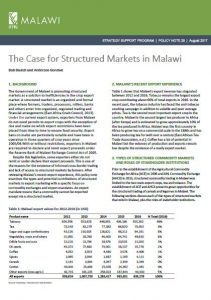 A new IFPRI-Malawi Policy Note examines the types and potential contributions of structured markets—organized and formal places where farmers, traders, processors, millers, banks and others may enter into regulated trading and financial arrangements.
A new IFPRI-Malawi Policy Note examines the types and potential contributions of structured markets—organized and formal places where farmers, traders, processors, millers, banks and others may enter into regulated trading and financial arrangements.
Structured markets are being promoted by the Government of Malawi as a solution to inefficiencies in the crop export market. Currently, exporters from Malawi do not need permits to export crops with the exception of rice and maize on which export restrictions have been placed from time to time to ensure food security.
With or without restrictions, exporters in Malawi are required to declare and remit export proceeds under the Reserve Bank of Malawi Exchange Control Act of 2005. Yet, despite this legislation, some exporters either do not remit or under-declare their export proceeds, one reason for the existence of informal cross-border trading and lack of access to structured markets by farmers.
This Policy Note considers Malawi’s recent export experience and makes a case for structured markets in Malawi, with a specific focus on commodity exchanges and export mandates, in which a commodity cannot be exported except via a structured market.
Author: Anderson Gondwe, 2017
